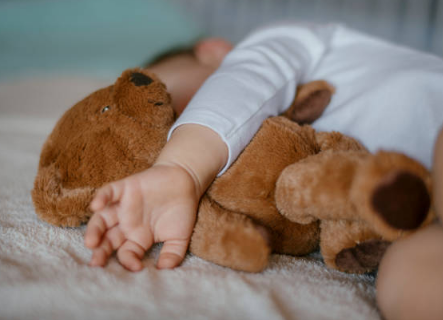You’ve closed the blackout curtains. You turn off all screens and dim all lights an hour before bedtime. While you’re quietly reading a bedtime story, your baby’s favorite sound machine will play rough and rumbling white noise. All in all, you’ve created a top-notch bedtime routine to help your child get the sleep they need. But did you know that your baby, toddler, or older child actually starts preparing your child for a good rest as soon as they wake up? It’s true! Learn which daytime Xi can help improve your child’s nighttime sleep.

Seek the Morning Sun
Exposure to natural sunlight outdoors during the day, especially in the morning, can regulate your child’s sleep hormone (melatonin). Experts agree that morning and afternoon light can help a child’s brain better identify when it’s time to sleep and when it’s time to wake up. Specifically, early morning sunlight slows down a child’s melatonin production in the morning and increases melatonin production at night, which helps improve sleep quality. That’s why studies have shown that babies and children who spend time outdoors sleep better than those who don’t.
Get Active!
Did you know that a little time on the stomach can help babies sleep better? According to a study in the journal Infant Behavior and Development, six-month-old babies who do physical activities such as tummy during the day tend to sleep better at night than babies who don’t “exercise.” The researchers noted that interacting with babies in floor activities throughout the day is also considered a “workout” for the little ones. If your baby can walk now, get those little legs moving! Studies have shown that for older children, physical activity and outdoor play are also associated with good sleep outcomes, including spending more time in bed. On the other hand, decreased physical activity (coupled with increased screen time) is associated with poor sleep. Toddlers are advised to have at least 30 minutes of adult-led running time each day and at least 1 hour of free play each day. Except when you doze off, your child should not be active for more than an hour at a time! For some positive thoughts, check out these gross motor activities designed for toddlers.
Have a Great Time
While babies can’t spend a late night snack with their loved ones until they are 12 months old, pediatrician Dr. Harvey Karp urges parents to bring caressing toys during the day, starting with their children around 6 months of age. Take it for a walk, put it on the changing table, or bring it into story time. In this way, your baby will begin to recognize their toys and associate them with comfort and security, which will eventually translate into confidence and success when sleeping. In fact, studies have shown that self-soothing behaviors, such as snuggling and caressing toys, release oxytocin, which leads to calmness.

To prepare your child’s caressing toy to be their best friend, wear or hold it for at least an hour every day for about a week before handing it to your baby. Your scent will transfer to it, making it more soothing. Plus, your scent can give your baby the illusion that you’re there.
Nap Time Is Right
Contrary to popular belief, exhausted babies don’t fall asleep faster at night and don’t sleep better. Once a baby is overtired, their fight-or-flight response is triggered, releasing the hormone cortisol that keeps the baby alert and noticeably uncalm and unable to sleep peacefully at bedtime. The solution is to make sure your child gets the nap they need, when they need it.
After the first few months, the goal of a good daytime sleep is for your baby to take naps about every two to three hours a day. By the time your baby reaches his or her first birthday, this changes to every three to five hours. (Learn about your baby’s wake-up window to help you get the right time.) It’s also important: Make sure your child wakes up from their last nap about three hours before bedtime and takes a nap within two hours. This means waking them up if your baby dozes off later! This can lead to more hunger and waking up at night.
Practice Magic Breathing
If your child is over 2 years old and can wait at least a minute, they can begin to learn Xi Magic Breathing, a soothing deep breathing exercise designed for children Xi. Children who know that they breathe magically are better able to regulate their emotions, resulting in calmer days and calmer bedtimes. First, guide your child to take a few quick breaths (two counts in, two counts out) and make a little hissing sound as the air flows in and out. When you both inhale, let one hand go up slowly, and then let it fall slowly as you exhale. Praise your child for “breathing well!” and tell how your body feels when you do so. (“Mom’s shoulders become so much lighter when we take magical breaths.”) Xi every day when your child is already relaxed, such as before napping, and gradually guide them to take more and slower breaths, aiming for at least five breaths at a time.

Maintain a Consistent Schedule
“Developing a predictable daily rhythm has been shown to be beneficial for your baby’s sleep,” says Dr. Karp. He points out that when your baby is 1 month old, you can develop a regular sleep schedule. While daily Xi naturally change as your child grows, doing the same things every day has been shown to reduce stress levels, boost self-confidence, and build a child’s sense of security – all of which bode well for sleep success. When planning your child’s routine, be sure to plan out repetition times for meals and snacks, outdoor activities, naps, quiet play, and more.
Eat and Sleep at the Same Time
Breastfed newborns need to eat at least 10 to 12 times a day, and if your child isn’t eating enough, they’ll definitely let you know all night! To help your baby stay full and sleep at night, feed every 1.5 to 2 hours during the day for the first few months. If your napping baby is still dozing off after two hours, wake them up to feed. These two daytime behaviors should help your baby get more sleep at night, Dr. Karp says.
Dinner “fattening”. Once your baby starts eating solid foods, Dr. Karp recommends adding a little avocado to your baby’s dinner. A healthy fat gain can help babies feel fuller for longer and sleep longer.
Limit foods that interfere with sleep. A 2022 report in the journal Nutrition found that drinking soft drinks or fast food was associated with shorter sleep duration and higher levels of sleep disruption in young children. A similar study in preschoolers and older children noted that regular consumption of nutrient-deficient foods may lead to unhealthy fluctuations in sleep-related hormones, which can negatively affect children’s circadian rhythms.
More products are available. The same nutrition study found that 2-year-olds who ate the most vegetables slept best. When choosing vegetables for dinner, consider leafy greens, which are rich in magnesium, a nutrient associated with improved sleep quality. (Here’s how to help your child eat more vegetables.)
